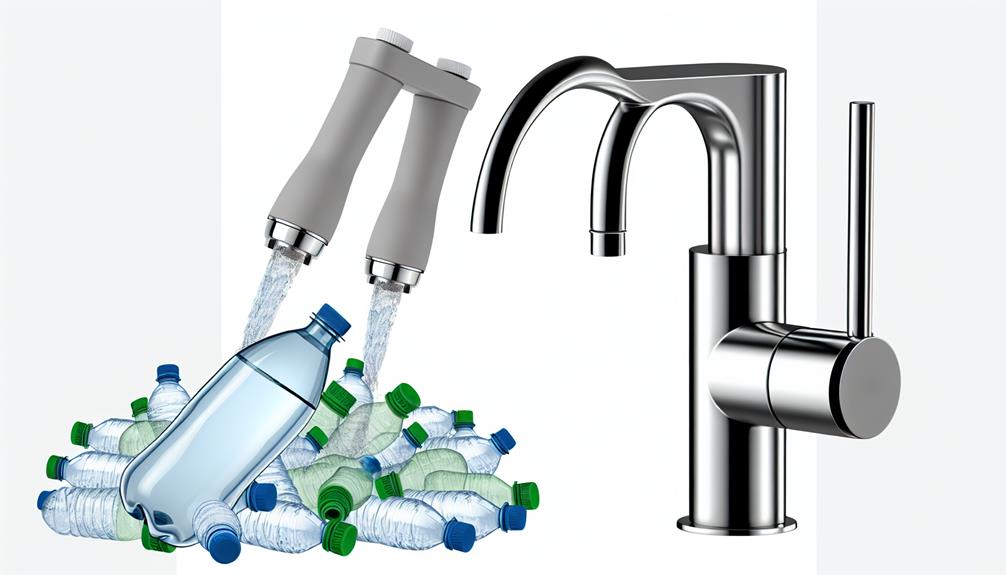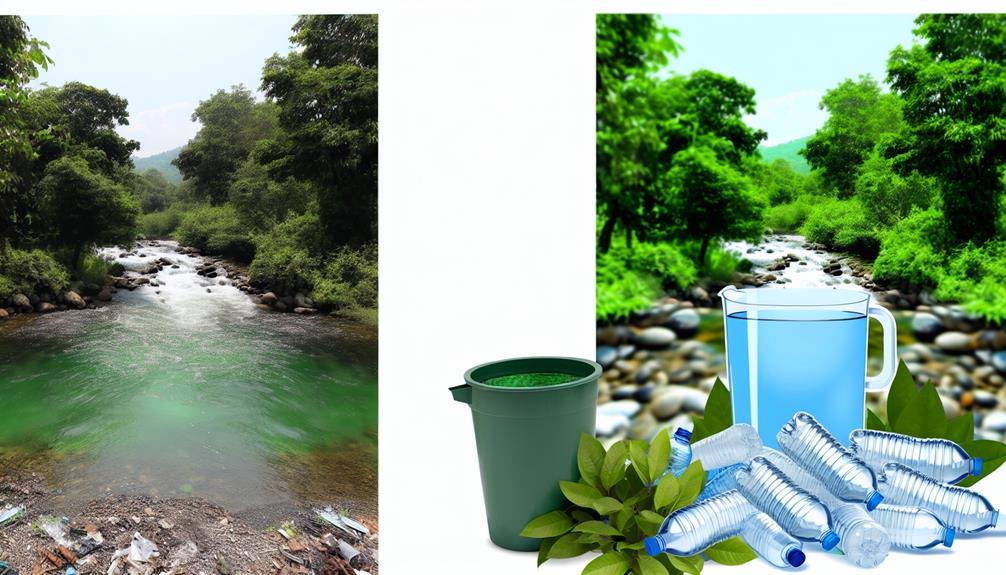In an ocean of plastic waste, your choice to switch to water filters becomes a beacon of environmental responsibility. You're aware that every plastic bottle you forgo can help to stem the tide of pollution choking our planet.
By opting for water filters, you join a growing movement that not only seeks to preserve natural resources but also to protect wildlife and reduce the carbon footprint associated with the production and transportation of bottled water.
You know that convenience shouldn't come at the cost of the environment, and yet, the question remains: can personal actions like yours tip the scales towards a more sustainable future?
The implications of this shift are profound, and as you consider the broader ramifications, you'll find that the ripple effect of your choices extends far beyond the confines of your own home.
The Plastic Pollution Crisis
The staggering volume of discarded plastic bottles not only clutters our landscapes but also poses a dire threat to marine ecosystems and contributes significantly to the global plastic pollution crisis. With annual plastic bottle production hitting a staggering 480 billion, a mere 57% recapture rate is unacceptable. You're left with 15 million bottles every day in the UK alone that aren't recycled, ending up littered, landfilled, or incinerated.
Consider the environmental impact: each bottle squanders 7 liters of water and other precious resources in its creation and takes an astonishing 450 to 1000 years to degrade. As a result, plastic waste generation skyrockets, and landfills can't cope with the influx, spilling over with millions of tons of plastic. Half of these bottles are for single-use, a luxury that the planet can no longer afford.
Germany's success with a plastic bottle return scheme, boasting a 97-98% recycling rate, demonstrates that high recovery rates are achievable. You can play a part in this. Opting for point-of-use water filtration not only slashes plastic consumption but also curtails the needless environmental cost of transporting bottled water. It's a simple step you can take to drastically reduce plastic waste and protect our planet.
Water Filters as a Solution
Harnessing water filters as a practical solution, you can significantly curb your reliance on single-use plastic bottles, thereby reducing environmental pollution and promoting sustainability. By using a water filter at home or in the office, you're taking a decisive step to reduce plastic waste. Water filtration systems contribute to a cleaner planet by providing an alternative to purchasing bottled water, which is often wrapped in plastic that may end up in landfills or oceans.
When you choose to use a water filter, you're not only ensuring access to safe and clean drinking water, but you're also embracing a sustainable and eco-friendly lifestyle. Pairing a water filtration system with a reusable water bottle can eliminate the need for single-use plastic, drastically reducing the amount of plastic that could otherwise pollute the environment.
The advantages of water filtration extend beyond just environmental benefits. These systems improve the taste, smell, and appearance of your tap water, making it more enjoyable to drink without the extra waste. With government interventions encouraging the reduction of disposable plastic bottles, it's easier than ever to contribute to environmental conservation. By committing to reduce your plastic waste, you're part of the solution.
Environmental Benefits of Filtration
Embracing water filtration systems at home not only trims down your plastic footprint but also contributes to a larger vision of environmental stewardship. When you choose a water filter system, such as those using reverse osmosis, you're opting for a method that can significantly reduce plastic waste. By cutting down on the number of single-use bottles you consume, you help reduce plastic waste and the energy and resources expended in manufacturing and transporting them.
The environmental benefits of using water filters extend beyond just reducing plastic waste. They play a critical role in conserving resources and lessening the overall environmental impact associated with the life cycle of plastic bottles. Moreover, these systems encourage the use of reusable bottles, further reducing plastic waste by eliminating the need for disposable options.
Impact on Waste Management
Reducing your reliance on single-use plastic bottles through water filters not only diminishes your environmental footprint but also eases the strain on waste management systems. Each year, billions of plastic water bottles are produced, creating a colossal waste challenge. By opting for water filtration systems, you significantly reduce the amount of plastic ending up in landfills.
The environmental toll of bottled water production isn't just about waste. It's also about the energy and resources expended in manufacturing and transporting these items. Water filters cut back on these processes, leading to fewer carbon emissions and a lighter ecological impact.
Future of Sustainable Hydration
Recognizing the positive impact water filters have on waste management, let's now explore how sustainable hydration practices could shape our future.
Imagine a world where each of us plays a pivotal role in safeguarding water resources and protecting marine life from the perils of water pollution. By adopting water filtration systems, you're not just reducing plastic consumption; you're part of a movement towards an environmentally friendly way of life, one that significantly cuts down your carbon footprint.
With water bottle sales hitting staggering numbers, the switch to sustainable hydration is no longer a choice but a necessity to combat climate change. It's not just about ditching single-use plastic; it's about embracing practices that preserve our planet for future generations.
By refilling water bottles and using point-of-use (POU) water filtration, you save a massive 156 kg of plastic waste annually compared to bottled water users and eliminate the need for extra carbon emissions caused by transport.
Governments are catching on, with proposed plastic bottle taxes and deposit schemes that have shown success in countries like Germany. By joining this eco-conscious wave, you contribute to a future where clean drinking water is accessible without the environmental cost of single-use plastics.
The power is in your hands—choose sustainable hydration.

